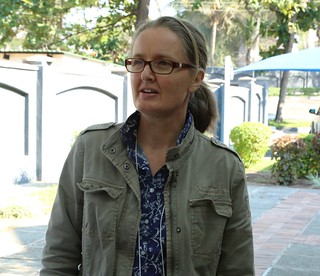RISING voices: Gundula Fischer, Africa RISING Gender Specialist (IITA)
Gundula Fischer, is the Africa RISING Gender Specialist at the International Institute of Tropical Agriculture (IITA). She introduces herself and her work within the Africa RISING program. This is one of a series of portraits of key people in Africa RISING.

Tell us about your background?
From my early days, I developed a great interest in the dynamics of society and culture. So, I pursued an MA degree in Social Anthropology from Ludwigs-Maximilians-University in Munich, Germany. Later I did my PhD studies at Bayreuth University, Germany. A partnership with the University of Dar es Salaam enabled me to do my fieldwork in Tanzania. My PhD thesis investigated how kinship impacts on the access to resources and the division of labour in a work setting. My later specialization in gender was but a shift to another criterion that works in similar ways: Gender often relates to the control over resources, to the type of work we do and the labour burden we have, to the way benefits are shared within the household.
What were you doing before joining Africa RISING?
Before I joined Africa RISING, I lectured for two private Tanzanian universities and supported them in the establishment of Master’s programs in sociology and anthropology. In addition, I served as the research coordinator of a European Union funded development project in Tanzania’s Southern Highlands.
What do you do in your current position within the project?
I have multiple assignments. One of them is to support my colleagues (the biophysicists and economists working in the project) to integrate more gender aspects in their work with the target groups. Apart from that, I conduct qualitative studies with a focus on gender. But I am also in charge of a gender capacity assessment (we are currently carrying out) and of gender action planning. These are just some of my activities.
What are your early impressions of gender within Africa RISING?
When I talk to my colleagues in the project I often get interesting information about gender. Many make observations in the field. What would be important now is to develop a more systematic approach to collecting gender-disaggregated data and to perform gender analysis based on these data.
What does it mean when somebody says a project has fully integrated gender? What is the ideal benchmark?
Gender mainstreaming is like a two-headed arrow with one head pointing in the direction of the target group and the other head pointing towards the organization implementing the activities. On the one hand, it is important to understand more of the gender dynamics in our target groups, for instance how do our technologies interact with intra-household gender dynamics in our action sites. That is part of gender analysis. On the other hand, there is the second direction of gender mainstreaming which leads us to reflect on our own organization. How are we dealing with gender issues within our own project? What about our internal policies and arrangements? What about our organizational culture? Gender is fully integrated, when we are deliberately working towards both directions.
How do you see current gender activities with regard to a possible second phase of the project?
I think we are at a stage where we can prepare very well for the possible second phase. For instance, the gender capacity assessment will give us a baseline of the training needs and how to address them. Moreover, we have agreed that we will emphasize gender analysis in the research outputs “situation analysis” and “systems improvement”. This will strengthen the gender foundation for the next phase.
Do you foresee any potential challenges in terms of data collection together with the biophysical scientists?
Of course, biophysicists, quantitative economists and qualitative anthropologists adhere to different paradigms in the sciences. However, a dialogue across boundaries can be very fruitful and is especially important in a systems approach. There is always room for learning from both sides as long as both groups keep an open mind.




